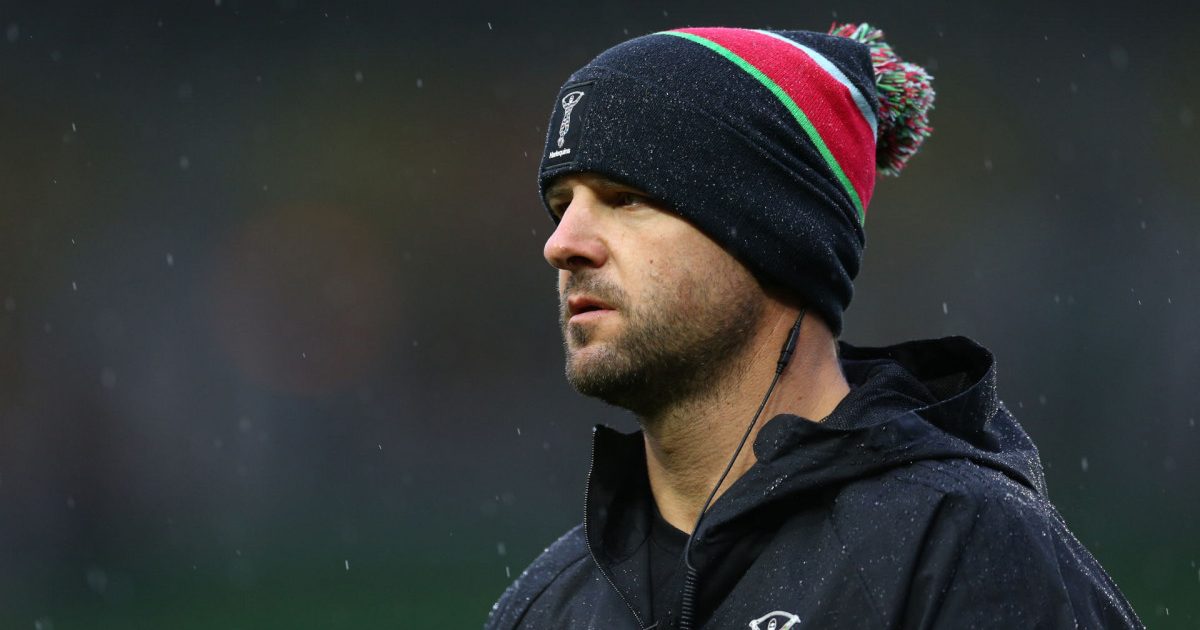Why teams kick so much, according to the Premiership's most frequent booters of the ball

Harlequins Marcus Smith, one of the most exciting runners in the English game, has put boot to ball 41 times in the opening two Gallagher Premiership fixtures which portrays a club – that has attacking rugby in its DNA – as one of the worst exponents of the kicking game that is disfiguring the sport.
Despite scoring six tries – a seventh was ruled out by a forward pass – in a 49-29 win over Northampton, Smith kicked 23 times to claim top spot in the kicking statistics going into the next round of Premiership matches against Gloucester on Sunday.
Former All Black No10 Nick Evans is the Quins attack coach and insists to see every kick as an aimless hoof downfield in a bid to make the opposition knock on or put the ball out on the full is to ignore the different ways the tactic can be used to manipulate and break open defences.
Against Northampton, Quins made 16 clean breaks with Smith controlling their tactical play with those 23 kicks while scrum-half Danny Care added another 13. However, what unfolded at Franklin’s Gardens wasn’t another boring game of kick tennis but a hugely impressive ball in hand performance that saw Quins constantly fracture the Northampton defence.
Nathan’s Earle’s try involved eight passes, Mike Brown raced over from a clever short pass, Smith side stepped his way to the line after an Andre Esterhuizen offload while Alex Dombrandt finished off a neatly judged chip from Smith behind the home defence.
Evans told RugbyPass: “Kicking has a massive part to play in the game and gets a bad rap when it is poor without a plan, a clear principle and philosophy. Our group understands our DNA and the way we want to play and that kicking is an important part of the game at the present time.
”Defensive line speed is probably the catalyst for why there is more kicking because as a defence you want to take away time and space. To negate that you need to find that space behind the defence. With the current contest at the breakdown, people are trying to create other contests (for the ball) and an aerial one is another chance to get the ball back or create pressure.
“We probably kicked as much as we had done against Exeter but fed off the mistakes made by Northampton with our kick chase. Marcus and Danny kicked well and we created pressure that way and we had the confidence to move the ball. Kicking rates across the board have gone up and it is the teams who are kicking more accurately that are getting successful results.
“Defences have got better, the players are better athletes and teams are not putting the numbers into rucks they were 10 years ago. Therefore, you have to find different ways of transferring pressure and that where kicking has evolved and why there is more of it.
“We put a lot of time into our kicking so there is clarity and, more importantly, everyone buys into it. If you have half the team that wants to run and pass and half that want to kick-chase then you are in a world of hurt. “
Evans believes creating quick ball from the breakdown – another area attracting plenty of attention – is key to manipulating defences and maximising the carrying power of the forwards. “It is tough and it does come down to speed of ball so the defence doesn’t have time to reset,” added Evans. “Defences are making it tougher for decision makers and 9 and 10s have to judge that on the back of momentum and need to go through a checklist in just one or two seconds.
Look who's back… #GLOvHARhttps://t.co/0PNkADTWPE
— RugbyPass (@RugbyPass) December 4, 2020
“If you are playing 10 or 12 phases in your own half then you are sapping the energy of your forwards. The forwards are doing all the tight work and then we have these carries we need them to make and if we are doing that in our own half then when we get into the opposition territory they don’t have any energy left. Defences are harder to break down and you have to more adaptive by having an attacking kicking play and more depth by being brave.”
Alex King, the former England outside half, is the Gloucester backs coach and recognises the varied attacking threats Quins will post on Sunday, including Smith’s kicking game. He said: “Marcus Smith is a player who thrives on the opportunities that present themselves in the game and he has a turn of speed, a chip game, a good passing game and a good relationship with Danny Care. That Care, Alex Dombrandt, Smith, Mike Brown axis has been really strong for them and they are well coached by Paul Gustard and his coaching team.”


















































